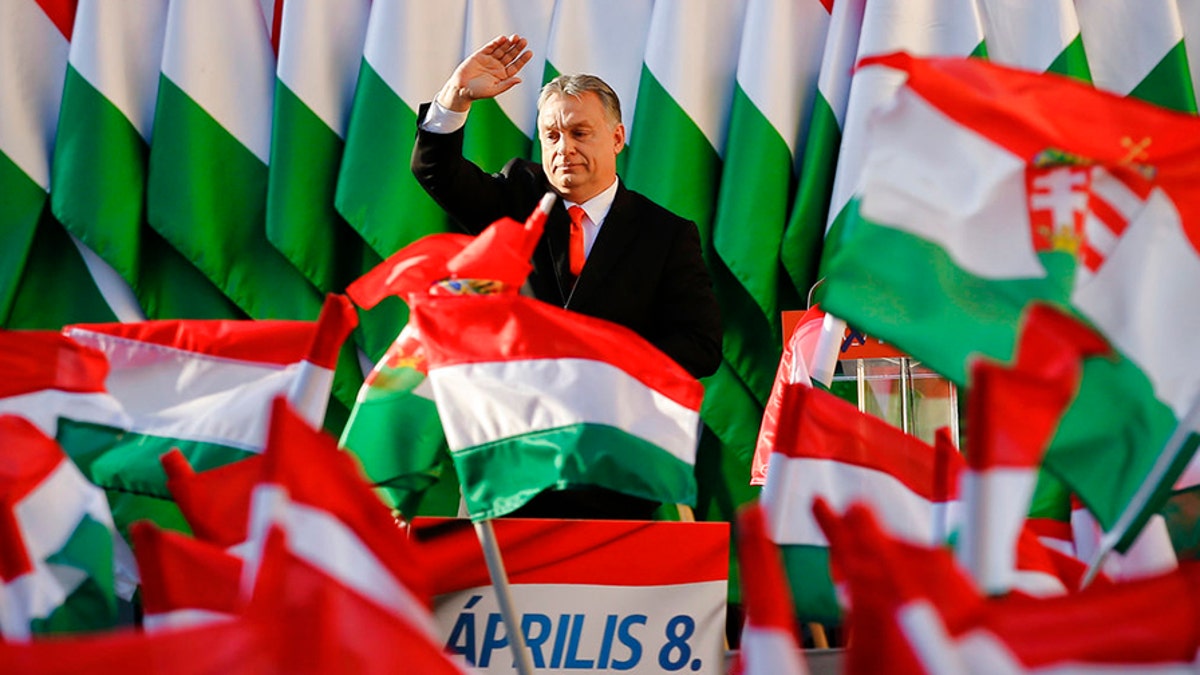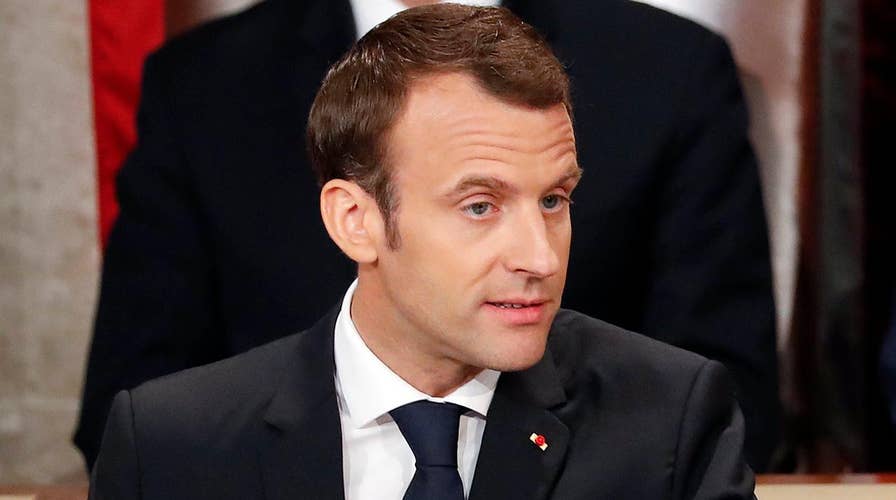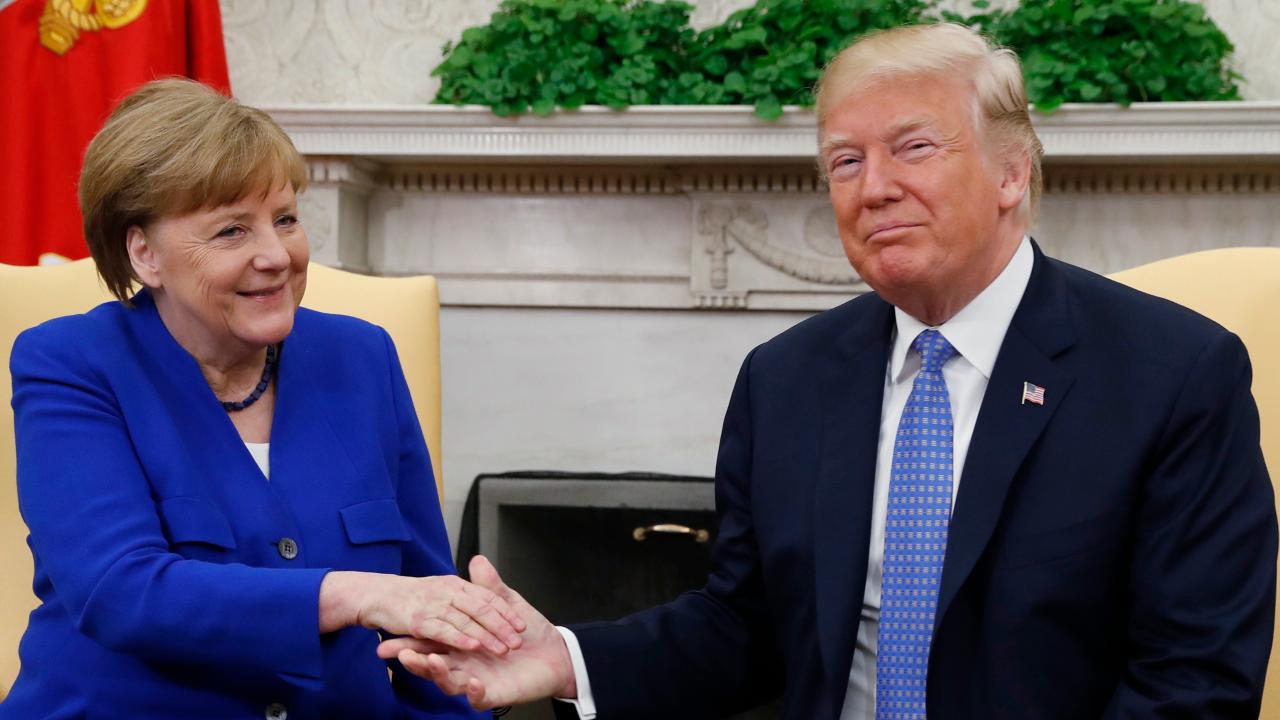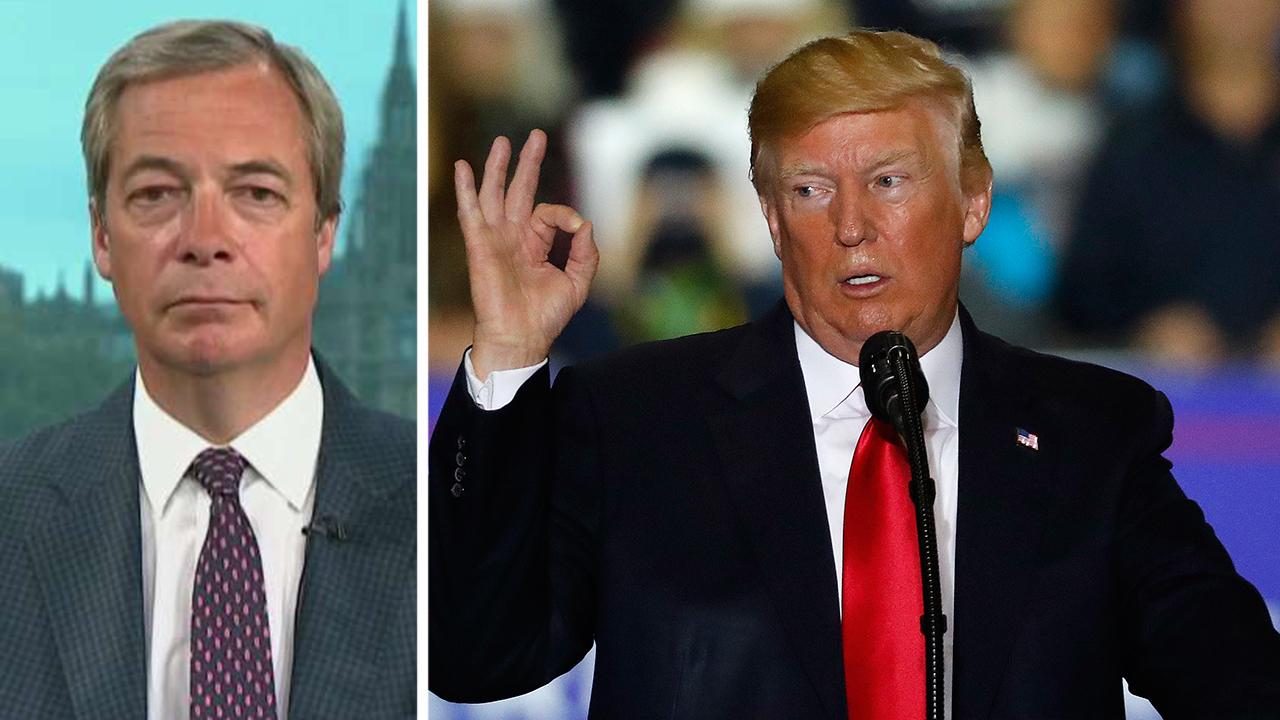Macron: Freedom is source of all that is worth living for
French President Emmanuel Macron addresses joint session of Congress.
Motivated by the 2015 mass migration crisis and skepticism of the European Union, the nationalist-populist movement is continuing to defy predictions of its demise and rack up wins across the continent -- increasing pressure on more “globalist” leaders to keep their vision of Europe intact.
Both French President Emmanuel Macron and German Chancellor Angela Merkel visited the White House last week, temporarily leaving behind the brewing and surging movement at home -- making nice with a president who has espoused many of the same stances as European nationalist-populist lawmakers.
But Macron also used a speech to Congress to slam nationalism as a tempting “temporary remedy to our fears.”
"We will not let the rampaging work of extreme nationalism shake a world full of hopes for greater prosperity," he said, also calling nationalism an “illusion.”
But in Europe, the rise of nationalist and populist parties throughout the continent is anything but an illusion.
After nationalist candidates won victories in the U.K., the U.S. and Italy in 2016, the nationalist and populist wave looked unstoppable. But it hit the rocks in 2017, picking up few wins and hit by Macron nudging out nationalist challenger Marine Le Pen in the closely-watched French presidential election.
But things have changed in 2018.
Hungarian Prime Minister Viktor Orban’s Fidesz Party won a super-majority last month by running a campaign focused predominantly on the issue of mass migration. Under Orban, Hungary had built a border fence and deployed the military to the border after hundreds of thousands of migrants walked through Hungary at the beginning of the 2015 migration crisis.
While analysts predicted a Fidesz victory, polls indicated that voters -- dulled by years of talk about migration -- would sour somewhat on Fidesz’ focus on the topic and trim the party’s majority. But Orban’s government predicted otherwise.

Hungarian Prime Minister Viktor Orban was handed a stronger majority in elections in April. (AP)
“We leave it to the voters, but this is a very clear question that should be decided, whether they would like to have a Hungarian Hungary or a Hungary occupied by migrants,” Foreign Minister Péter Szijjártó told Fox News ahead of the vote.
Hungary’s victory comes on the back of a quick-fire set of wins for nationalist and populist parties across the continent. In January Czech Republic President Milos Zeman, also running on an anti-mass migration platform, beat political neophyte Jiri Drahos.
Zeman’s supporters had commissioned billboards with “Stop migrants and Drahos.”
In December, across the border from Merkel's Germany, a right-wing government was formed under now-Chancellor Sebastian Kurz -- whose center right People’s Party (OVP) campaigned primarily on a tough stance on migration, and formed a coalition with the far-right Freedom Party (FPO).
In March, Italy’s political system was roiled by an election that saw big wins for the populist 5-Star Movement and the right-wing nationalist League. While the 5-Star is more of an anti-establishment party than nationalist, it has consistently shown skepticism of the European Union and has flirted with the possibility of a referendum for Italy to leave the bloc.
Parties have been scrambling to muster a coalition that can govern after no party or coalition won a clear majority, and it is possible that fresh elections may be called for the summer. Whether that favors the insurgents or the traditional parties is unclear.
But with support for center-left parties dwindling, and populist voices outshining traditional conservative voices on the right, there’s no indication that the nationalist-populist wave is slowing down.
“I strongly predict the revolution will keep rolling,” former U.K. Independence Party Leader Nigel Farage, a central actor in Britain’s 2016 decision to leave the European Union, told Fox News.
“The Macron agenda -- more money, more taxation, more military power, foreign policy without national veto -- everything Macron is talking about runs into a headlong collision with the way the peoples of Europe are feeling,” he said.
In Germany, Merkel -- who was labeled “the most important leader in the free world” by Hillary Clinton last year -- has only recently managed to form a coalition to keep her in power after having her party’s hold weakened in September’s federal elections.
That weakening grip came amid a rise of support of the nationalist Alternative for Germany (AfD), which has seen its support rise significantly as it has campaigned against Merkel’s immigration policies, specifically her 2015 decision to open her country’s borders to refugees fleeing Syria.
Merkel has in turn responded by taking a harder line on immigration. She has expressed regret for how the crisis was handled, placed hardliner Horst Seehofer in the Interior Ministry and has admitted the existence of “no-go” areas in Germany -- something frequently dismissed by left-wing commentators and politicians as a right-wing fantasy.
Macron is in a safer spot, but not by much. He won his 2017 election comfortably against Le Pen and does not face re-election until 2022. However, his poll numbers dived soon after election, particularly amid controversies involving his reform of labor union laws, now hovering around 40 percent.
He has used his office to try and rally a pro-Europe force in the face of the nationalist-populist surge. Ahead of his speech to Congress, Macron addressed the European Parliament and called for the building up of “E.U.-wide sovereignty” in the face of the nationalist threat.
"Indeed, in these difficult times, the European democracy is our best chance," he told European members of parliament. "The worst possible mistake would be to give up on our model and our identity."
But at home, he has also sought to take some of the wind out of the nationalist right’s sails. Specifically, he has upset his country’s left-wing by proposing laws that would streamline the processing and deportations of failed asylum seekers, as well as talking tough on Islamic terrorism.
Other leaders have taken similar steps to try to ward off populist challenges, shifting to the right like Merkel. In the Netherlands, Prime Minister Mark Rutte issued a full page newspaper advert blasting migrants who refused to integrate.
“I understand the people who think that if you so fundamentally reject our land, I prefer that you leave,” the letter said, according to The Washington Post. “As it happens I have that feeling, too. Act normal or go away.”
But as pro-European Union forces look for a leader, Farage says that such hopes may be wrongly placed in the dashing Frenchman.
“If they really think that Monsieur Macron with his fanatical love of the European project and supranationalism is somehow going to improve their fortune, my views is that they’ve got another thing coming.”











































